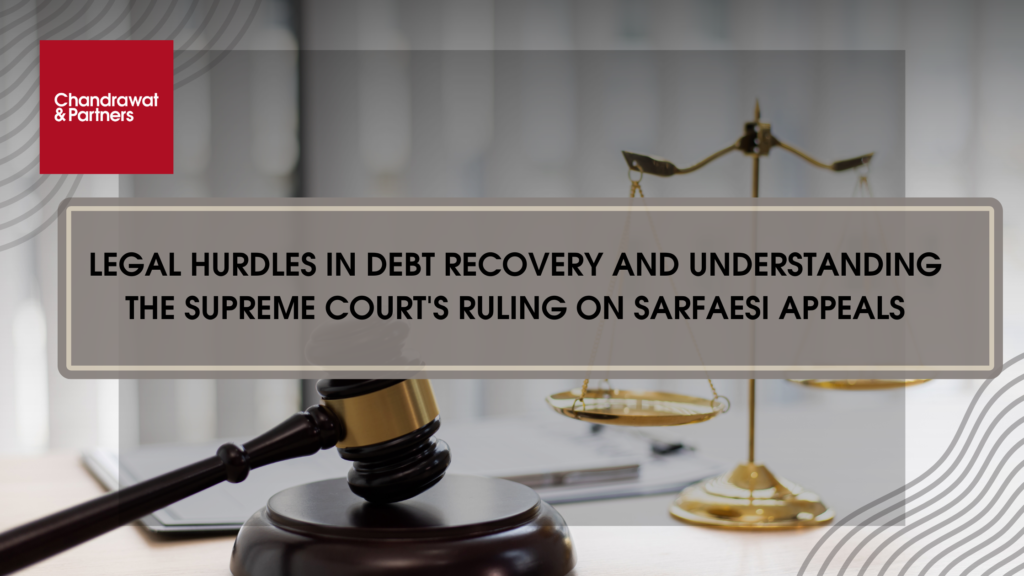
LEGAL HURDLES IN DEBT RECOVERY AND UNDERSTANDING THE SUPREME COURT’S RULING ON SARFAESI APPEALS
In the case of Chetan Prabhashankar Joshi vs Board of directors of Pegasus assets reconstruction private limited the Supreme Court declined to provide notice in a petition under Section 18 of the Securitization and Reconstruction of Financial Assets and Enforcement of Security Interest (“SARFAESI”) Act contesting the legality of the 50% pre-deposit requirement for appeals to the Debt Recovery Appellate Tribunal (“DRAT”). This ruling, was rendered on June 26 by the vacation bench. The bench raised serious questions about the borrowers’ access to justice and the real-world effects of the pre-deposit requirement.
A CLOSER LOOK AT THE SARFAESI ACT AND THE ROLE OF SECTION 18
A key piece of Indian legislation, the Securitization and Reconstruction of Financial Assets and Enforcement of Security Interest (SARFAESI) Act, 2002, was created to give banks and other financial institutions the ability to effectively manage non-performing assets (NPAs) without having to go through the long process of legal system. Borrowers may file an appeal against the DRAT rulings under Section 17 of the legislation. Also, as per the Section 18, in order to file an appeal with the DRAT, the borrower must deposit either 25% of the total amount owed to the bank or 50% of it. Section 18 guarantees that parties who feel that the conduct of secured creditors have negatively impacted their interests have a legal avenue of recourse. This promotes harmony between the protection of borrowers and the rights of creditors.
CONTENTIONS OF THE PETITIONER
The petitioner, a director of the company, maintained that asking the borrowers to deposit a significant amount of the outstanding amount in order to file an appeal essentially voids the right to file an appeal, particularly for those who are already struggling financially. The petitioner emphasized that term loans, which have periods ranging from 10 to 15 years, make up the majority of bank loans. The defaulted sum that typically initiates a SARFAESI action is only around 5% or less of the total amount borrowed. In spite of this, in order to have their appeal considered, the borrower must deposit half of the total loan amount.
An example was given by the Petitioner to highlight this disparity that- even if a borrower only defaults on 5% of the overall loan amount, they still have to pay back 50% of the loan balance in order to file an appeal, which can be extremely costly. The petitioner further argued that the pre-deposit requirement is implied to apply to all appeals, including those resulting from interim orders, by the term “any order” in Section 18’s provisos. This wide-ranging implementation intensifies the strain on debtors, possibly making the appeals procedure unfeasible and unattainable.
SUPREME COURT’S REJECTION TO THE PLEA
The reason for the Supreme court’s refusal was based on two motives, mainly The Court observed that the petitioner was entitled to an alternative remedy under Article 226 of the Indian Constitution through the Bombay High Court. High Courts are authorized by Article 226 to issue writs, orders, or instructions to any person or authority, including in cases involving infringement of basic rights. And apart from this the Court noted that CJEX Biochem Pvt. Ltd., the petitioner’s company, had previously filed a comparable plea with the Supreme Court. The order to list the petition before a designated bench had already been issued by the Court. In light of these facts, the Supreme Court decided not to consider the new petition under Article 32 of the Constitution, which permits anybody to immediately petition the Supreme Court on issues pertaining to fundamental rights.
FURTHER IMPLICATION AND AFTERMATH
Pre-deposit requirements are meant to deter pointless appeals and guarantee that only legitimate claims are pursued. But the cost it entails can discourage justifiable appeals, especially for individuals who are already having difficulty making ends meet. The hefty pre-deposit demand, according to critics, disproportionately harms small and medium-sized businesses (SMEs) and individual borrowers, who do not have the funds to comply with such requirements. This might pose an obstacle to justice resulting in a scenario where borrowers who cannot afford the pre-deposit are unable to contest unfair orders.
OBSERVATION
Important concerns about borrowers’ access to justice are brought to light by the Supreme Court’s decision to reject notice in the case contesting the SARFAESI Act’s pre-deposit requirement. Pre-deposit requirements are meant to prevent pointless appeals, but in practice, they can impede valid challenges and disproportionately affect borrowers in financial trouble. In order to resolve complaints and advocate for the essential changes to the SARFAESI Act, borrowers and legal professionals must carefully traverse these complications.
For more information or queries, please email us at
enquiries@chandrawatpartners.com



